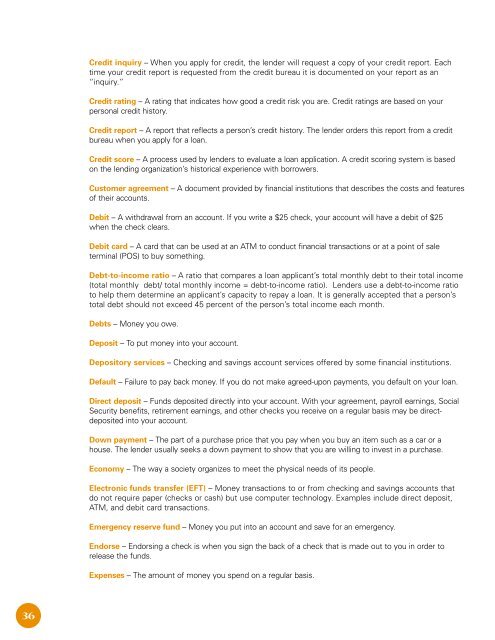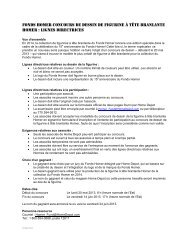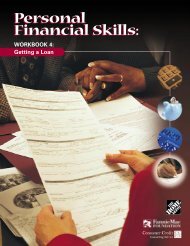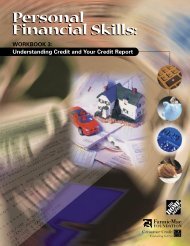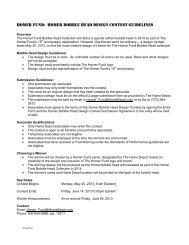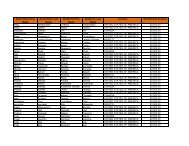Working With Checking and Savings Accounts - The Homer Fund
Working With Checking and Savings Accounts - The Homer Fund
Working With Checking and Savings Accounts - The Homer Fund
Create successful ePaper yourself
Turn your PDF publications into a flip-book with our unique Google optimized e-Paper software.
Credit inquiry – When you apply for credit, the lender will request a copy of your credit report. Each<br />
time your credit report is requested from the credit bureau it is documented on your report as an<br />
“inquiry.”<br />
Credit rating – A rating that indicates how good a credit risk you are. Credit ratings are based on your<br />
personal credit history.<br />
Credit report – A report that reflects a person’s credit history. <strong>The</strong> lender orders this report from a credit<br />
bureau when you apply for a loan.<br />
Credit score – A process used by lenders to evaluate a loan application. A credit scoring system is based<br />
on the lending organization’s historical experience with borrowers.<br />
Customer agreement – A document provided by financial institutions that describes the costs <strong>and</strong> features<br />
of their accounts.<br />
Debit – A withdrawal from an account. If you write a $25 check, your account will have a debit of $25<br />
when the check clears.<br />
Debit card – A card that can be used at an ATM to conduct financial transactions or at a point of sale<br />
terminal (POS) to buy something.<br />
Debt-to-income ratio – A ratio that compares a loan applicant’s total monthly debt to their total income<br />
(total monthly debt/ total monthly income = debt-to-income ratio). Lenders use a debt-to-income ratio<br />
to help them determine an applicant’s capacity to repay a loan. It is generally accepted that a person’s<br />
total debt should not exceed 45 percent of the person’s total income each month.<br />
Debts – Money you owe.<br />
Deposit – To put money into your account.<br />
Depository services – <strong>Checking</strong> <strong>and</strong> savings account services offered by some financial institutions.<br />
Default – Failure to pay back money. If you do not make agreed-upon payments, you default on your loan.<br />
Direct deposit – <strong>Fund</strong>s deposited directly into your account. <strong>With</strong> your agreement, payroll earnings, Social<br />
Security benefits, retirement earnings, <strong>and</strong> other checks you receive on a regular basis may be directdeposited<br />
into your account.<br />
Down payment – <strong>The</strong> part of a purchase price that you pay when you buy an item such as a car or a<br />
house. <strong>The</strong> lender usually seeks a down payment to show that you are willing to invest in a purchase.<br />
Economy – <strong>The</strong> way a society organizes to meet the physical needs of its people.<br />
Electronic funds transfer (EFT) – Money transactions to or from checking <strong>and</strong> savings accounts that<br />
do not require paper (checks or cash) but use computer technology. Examples include direct deposit,<br />
ATM, <strong>and</strong> debit card transactions.<br />
Emergency reserve fund – Money you put into an account <strong>and</strong> save for an emergency.<br />
Endorse – Endorsing a check is when you sign the back of a check that is made out to you in order to<br />
release the funds.<br />
Expenses – <strong>The</strong> amount of money you spend on a regular basis.<br />
36


